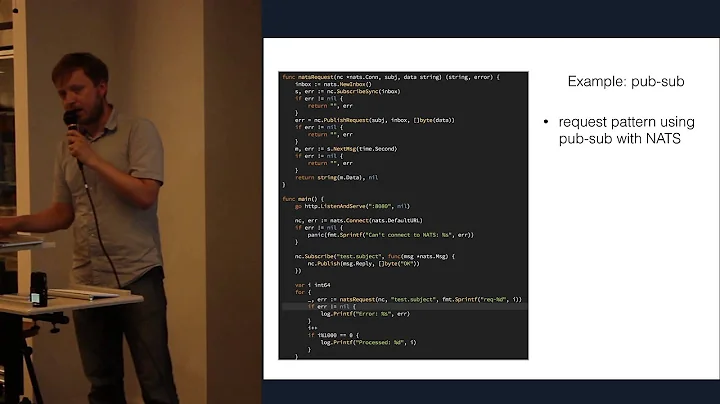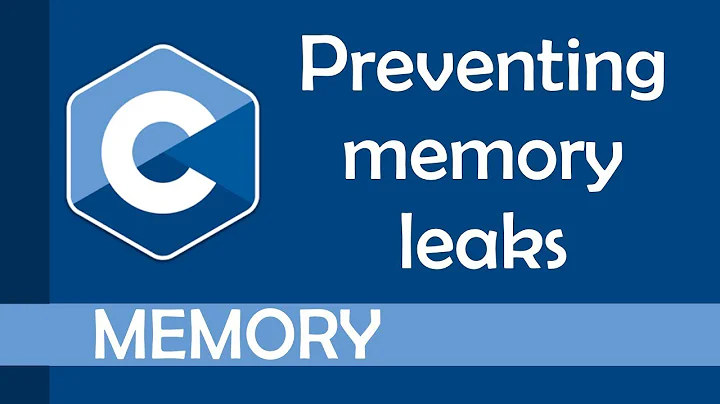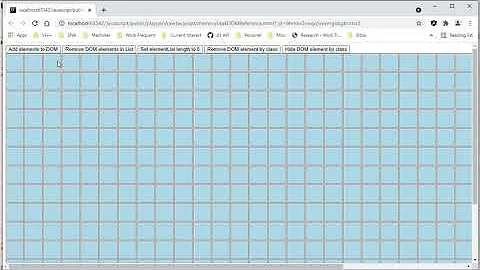What strategies and tools are useful for finding memory leaks in .NET?
Solution 1
I use Scitech's MemProfiler when I suspect a memory leak.
So far, I have found it to be very reliable and powerful. It has saved my bacon on at least one occasion.
The GC works very well in .NET IMO, but just like any other language or platform, if you write bad code, bad things happen.
Solution 2
Just for the forgetting-to-dispose problem, try the solution described in this blog post. Here's the essence:
public void Dispose ()
{
// Dispose logic here ...
// It's a bad error if someone forgets to call Dispose,
// so in Debug builds, we put a finalizer in to detect
// the error. If Dispose is called, we suppress the
// finalizer.
#if DEBUG
GC.SuppressFinalize(this);
#endif
}
#if DEBUG
~TimedLock()
{
// If this finalizer runs, someone somewhere failed to
// call Dispose, which means we've failed to leave
// a monitor!
System.Diagnostics.Debug.Fail("Undisposed lock");
}
#endif
Solution 3
We've used Ants Profiler Pro by Red Gate software in our project. It works really well for all .NET language-based applications.
We found that the .NET Garbage Collector is very "safe" in its cleaning up of in-memory objects (as it should be). It would keep objects around just because we might be using it sometime in the future. This meant we needed to be more careful about the number of objects that we inflated in memory. In the end, we converted all of our data objects over to an "inflate on-demand" (just before a field is requested) in order to reduce memory overhead and increase performance.
EDIT: Here's a further explanation of what I mean by "inflate on demand." In our object model of our database we use Properties of a parent object to expose the child object(s). For example if we had some record that referenced some other "detail" or "lookup" record on a one-to-one basis we would structure it like this:
class ParentObject
Private mRelatedObject as New CRelatedObject
public Readonly property RelatedObject() as CRelatedObject
get
mRelatedObject.getWithID(RelatedObjectID)
return mRelatedObject
end get
end property
End class
We found that the above system created some real memory and performance problems when there were a lot of records in memory. So we switched over to a system where objects were inflated only when they were requested, and database calls were done only when necessary:
class ParentObject
Private mRelatedObject as CRelatedObject
Public ReadOnly Property RelatedObject() as CRelatedObject
Get
If mRelatedObject is Nothing
mRelatedObject = New CRelatedObject
End If
If mRelatedObject.isEmptyObject
mRelatedObject.getWithID(RelatedObjectID)
End If
return mRelatedObject
end get
end Property
end class
This turned out to be much more efficient because objects were kept out of memory until they were needed (the Get method was accessed). It provided a very large performance boost in limiting database hits and a huge gain on memory space.
Solution 4
You still need to worry about memory when you are writing managed code unless your application is trivial. I will suggest two things: first, read CLR via C# because it will help you understand memory management in .NET. Second, learn to use a tool like CLRProfiler (Microsoft). This can give you an idea of what is causing your memory leak (e.g. you can take a look at your large object heap fragmentation)
Solution 5
Are you using unmanaged code? If you are not using unmanaged code, according to Microsoft, memory leaks in the traditional sense are not possible.
Memory used by an application may not be released however, so an application's memory allocation may grow throughout the life of the application.
From How to identify memory leaks in the common language runtime at Microsoft.com
A memory leak can occur in a .NET Framework application when you use unmanaged code as part of the application. This unmanaged code can leak memory, and the .NET Framework runtime cannot address that problem.
Additionally, a project may only appear to have a memory leak. This condition can occur if many large objects (such as DataTable objects) are declared and then added to a collection (such as a DataSet). The resources that these objects own may never be released, and the resources are left alive for the whole run of the program. This appears to be a leak, but actually it is just a symptom of the way that memory is being allocated in the program.
For dealing with this type of issue, you can implement IDisposable. If you want to see some of the strategies for dealing with memory management, I would suggest searching for IDisposable, XNA, memory management as game developers need to have more predictable garbage collection and so must force the GC to do its thing.
One common mistake is to not remove event handlers that subscribe to an object. An event handler subscription will prevent an object from being recycled. Also, take a look at the using statement which allows you to create a limited scope for a resource's lifetime.
Related videos on Youtube
Scott Langham
Updated on April 21, 2022Comments
-
Scott Langham about 2 years
I wrote C++ for 10 years. I encountered memory problems, but they could be fixed with a reasonable amount of effort.
For the last couple of years I've been writing C#. I find I still get lots of memory problems. They're difficult to diagnose and fix due to the non-determinancy, and because the C# philosophy is that you shouldn't have to worry about such things when you very definitely do.
One particular problem I find is that I have to explicitly dispose and cleanup everything in code. If I don't, then the memory profilers don't really help because there is so much chaff floating about you can't find a leak within all the data they're trying to show you. I wonder if I've got the wrong idea, or if the tool I've got isn't the best.
What kind of strategies and tools are useful for tackling memory leaks in .NET?
-
Kevin over 15 yearsThe title of you post doesn't really match the question in your post. I suggest you update your title.
-
Scott Langham over 15 yearsYou're right. Sorry, I was getting a little fed up with the current leak I'm hunting! Title updated.
-
GEOCHET over 15 years@Scott: Don't be fed up with .NET, it is not the problem. Your code is.
-
Scott Langham over 15 yearsYep, my code, or the third party libraries I have the pleasure of using.
-
GEOCHET over 15 years@Scott: See my answer. MemProfiler is worth it. Using it will also give you a whole new level of understand of the .NET GC world.
-
Brian ONeil over 15 yearsI have found a few really good articles that have been usefull to me when looking at memory issues in .NET and I have kept a reference to them so I have them around. Debugging Memory Problems (MSDN) Debugging Tools for Windows SOS Debugging Extensions These have all been very useful. I come from a C++ background too so I know what you mean. In the end there is a lot of overlap in the tools that you use to lo
-
Yigit over 15 yearsYou may want to check out dotTrace by JetBrains (makers of Resharper). Fantastic tool! jetbrains.com/profiler
-
John Smith over 12 yearsyou can use deleaker - good tool for debugging memory leaks...
-
Steven over 9 yearsSorry for bringing up such an old issue, but why did OP say: "C# philosophy is that you shouldn't have to worry about such things"
-
Scott Langham over 9 years@Steven - As a C++ programmer coming to C#, I learnt that C# is garbage collected and that unused memory should automatically be returned to the OS. In the documentation I read at the time it seemed that this mindset was promoted, and indeed, with relatively small C# apps, you can just about get away with thinking like that.
-
-
Gord over 15 yearsI second this product. It was one of the best profilers that I have used.
-
Alex S over 15 yearsSee blogs.msdn.com/tess/archive/2006/01/23/…. It doesn't really matter whether memory leak is "traditional" or not, it's still a leak.
-
Scott Langham over 15 yearsYep, I had a go with this one, and it helped me get to the bottom of some tricky leaks. The largest leaks I had turned out to be caused by third party libraries in unmanaged code they accessed via interop. I was impressed that this tool detected leaks in unmanaged code as well as managed code.
-
Scott Langham over 15 yearsI've accepted this as the answer because its what worked for me in the end, but I think all of the other answers are very useful. By the way, this tool is more commonly called SciTech's Mem Profiler!
-
Siken over 15 yearsI see your point -- but inefficient allocation and reuse of memory by a program is different than a memory leak.
-
Scott Langham over 15 yearsYes, this works well, especially for more advanced stuff or diagnosing problems in released software that you can't easily attach a debugger to. This blog has lots of tips on using these tools well: blogs.msdn.com/tess
-
Scott Langham almost 15 yearsI found the profiler to be quite good for looking at performance issues. However, the memory analysis tools were pretty poor. I found a leak with this tool, but it was rubbish at helping me identify the cause of the leak. And it doesn't help you at all if the leak happens to be in unmanaged code.
-
Scott Langham almost 15 yearsYep. CLRPRofiler is pretty cool. It can get a bit explosive with information when trying to dig through the view it gives you of allocated objects, but everything is there. It's definitely a good starting point, especially as its free.
-
Scott Langham over 14 yearsOk, the new version 5.1, is a heck of a lot better. It's better at helping you find the cause of the leak (although - there are still a couple of problems with it that ANTS have told me they'll fix in the next version). Still doesn't do unmanaged code though, but if you're not bothered about unmanaged code, this is now a pretty good tool.
-
user3341701 over 14 yearsgood answer, thank you for remembering me that event handlers can be dangerous.
-
supercat about 13 years@Timothy Lee Russel: If an unbounded(1) amount of memory can remain simultaneously allocated (rooted) after becoming useless(2), without anything in the system having the information and impetus necessary to unroot it in timely fashion, that's a memory leak. Even if the memory might get freed someday, if enough useless stuff might accumulate to choke the system before that happens, it's a leak. (1) Greater than O(N), N being the amount of useful allocation; (2) Stuff is useless if removing references to it would not affect program functionality.
-
Siken about 13 years@supercat - We'll just have to disagree here. Poor management of memory resources is not the same as a memory leak.
-
supercat about 13 years@Timothy Lee Russel: The normal "memory leak" pattern occurs when memory is held by one entity on behalf of another entity, expecting to be told when it's no longer needed, but the latter abandons the entity without telling the first one. The entity holding the memory doesn't really need it, but there's no way of determining that.
-
Offler almost 9 years@TimothyLeeRussell Without going to unmanaged code you can easily have a memory leak in .net. Attach something to an event listener. Remove the something but don't remove the event. Garbage collector will not clean up, because there is a reference to the object.
-
Siken almost 9 years@Offler Indeed, I specifically mentioned that in my answer. If you want an object recycled that has an event listener it will not be recycled without detaching the hook. I would argue that the GC is not responsible for understanding your "intent"...if you do not detach the hook, according to the framework's rules, you are saying you don't want the memory to be reclaimed.
-
HellBaby almost 6 yearsyou may be the only one :)
-
 Pedro77 almost 6 yearsI would prefer to throw an exception instead of Debug.Fail
Pedro77 almost 6 yearsI would prefer to throw an exception instead of Debug.Fail -
 redeye about 5 yearsI tried it too. I think this is a good tool. Easy to use, informative. Integrates to Visual Studio
redeye about 5 yearsI tried it too. I think this is a good tool. Easy to use, informative. Integrates to Visual Studio -
Michael Kargl over 4 yearsIn our case, when troubleshooting memory leaks, the Visual Studio Snapshot tool crashed/didn't snapshot. Dotmemory kept its cool and handled multiple snapshots of 3+ GB with (seemingly) ease.
-
nawfal about 2 yearsBlog link is broken?
-
outcoldman about 2 years@nawfal fixed the link!







